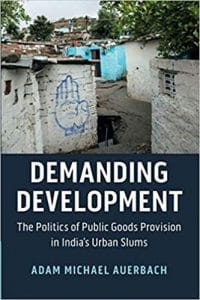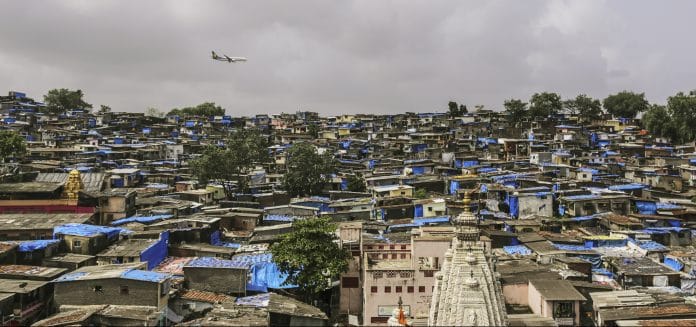In slums with dense concentrations of party workers, the electoral compulsions of parties, material self-interest of party workers, and needs of residents converge to generate an incentive structure that encourages development. Workers have incentives to secure public services in the effort to maintain and expand their public following – and access to rents, patronage, and party promotion. Dense party worker networks also strengthen a settlement’s capacity to mobilize for protest and provide political connectivity that can be leveraged in dealings with politicians and officials. What, though, are the implications of having party workers from different parties living and competing in the same settlement? How, if at all, might this impact local public goods provision?
The presence of party workers with different partisan ties adds a unique dynamic to the nature of competition among them for a following. Copartisan workers have shared incentives to ensure the victory of their party, given the importance of having co-partisans in power for claimmaking. Multiparty representation among party workers in a settlement intensifies competition across partisan lines and, therefore, might increase the responsiveness of party workers to resident demands.
On this point, one slum leader in Bhopal described how interparty competition among slum leaders is beneficial to local development: “Having many leaders and many parties helps the slum because it creates a pressure of competition. That will make people have to do better. Because now I am worried that if I don’t do well, I will lose supporters.” Moreover, having slum leaders affiliated with different parties provides multipronged partisan linkages in a context marked by frequent party turnover at the municipal, state, and national levels. If a seat changes party, residents can shuffle behind a party worker from the incumbent party, taking advantage of his or her political connectivity.
Also Read: India’s urban and rural poor expect different things from their local govts, and why it matters
My fieldwork, however, presented several reasons to be less optimistic about the influence of partisan competition among party workers in a settlement. Parties can internalize some of the negative externalities associated with intraparty competition through shared electoral interests and hierarchical discipline. Multiparty networks lack such mechanisms. Competing networks have incentives to undermine each other’s efforts in mobilizing residents to improve local conditions. While rumors are the everyday artillery in these confrontations, violence is also at times employed. The presence of multiparty workers can serve to fragment the leadership of slums, dampening the scale of collective action and, in turn, the provision of public services.
Politicians articulated a second reason why the presence of party workers with different partisan affiliations can undermine development. I asked a BJP MLA in Bhopal why some settlements are prioritized over others in the allocation of public resources. He replied, “Where did you get good votes? The other factor is your workers, if they are strong, if they are able to convince you, you give work priority to that place.” I asked him to clarify what he meant by “good votes.” He responded, “Where you get majority votes, those areas automatically get priority.”
A BJP MLA in Jaipur echoed this same sentiment: “Wherever [the politician] gets more votes, more supporters, that will be his priority area.” These statements are consistent with the logic of core targeting, evidence of which has been documented in studies of distributive politics in India and elsewhere. Camp, for example, finds in Argentina that “parties over-invest in neighborhoods where they already have strong support.”
The composition of party workers in a settlement is a potential way for politicians to estimate the partisan leanings of that settlement. The presence of rival workers might signal that the settlement is not fully committed. It means that rival workers are attempting to undermine the politician’s reputation, steal votes, and take credit for development projects. If politicians observe opposition workers in a settlement, they might allocate projects to more loyal areas. Partisan competition, therefore, may attenuate the positive influence of party worker density.
Also Read: Behind the wall — Story of the Ahmedabad community Modi govt hid from US President Trump
The following letter, written by an INC slum leader in Bhopal, illustrates this point:
This is to inform you that [this area of the city has] been subject to discrimination on account of political reasons. BJP politicians are ignoring public issues [here], including neglecting basic responsibilities like cleaning initiatives … On account of the politicians’ attitudes towards the residents [of this area], the latter are deprived of other necessities, like clean water, sewers, drainage, pensions, etc. The lives of residents here have become appalling.
Politicians are eager to expend resources in ways for which they can claim credit. Steering resources to slums that are mostly or exclusively home to co-partisan party workers increases the odds that residents will learn about the politician’s efforts – through word of mouth, ribbon-cutting ceremonies, and the tagging of infrastructure with signs and graffiti.
There are, consequently, reasons to anticipate that the presence of party workers with different partisan affiliations has multiple, crosscutting effects on the provision of public services. The following chapters will assess the relationship between the partisan distribution of party workers and outcomes in local development.
 This excerpt from Demanding Development by Adam Michael Auerbach has been published with permission from Cambridge University Press.
This excerpt from Demanding Development by Adam Michael Auerbach has been published with permission from Cambridge University Press.







This is absolute truth about developing nation like India, which is intolerable. The foreigner write a book about this & we read it & give our remarks over the same, because the party workers know it better & we know it at the best.
This is unique truth, why do we discuss about it better.